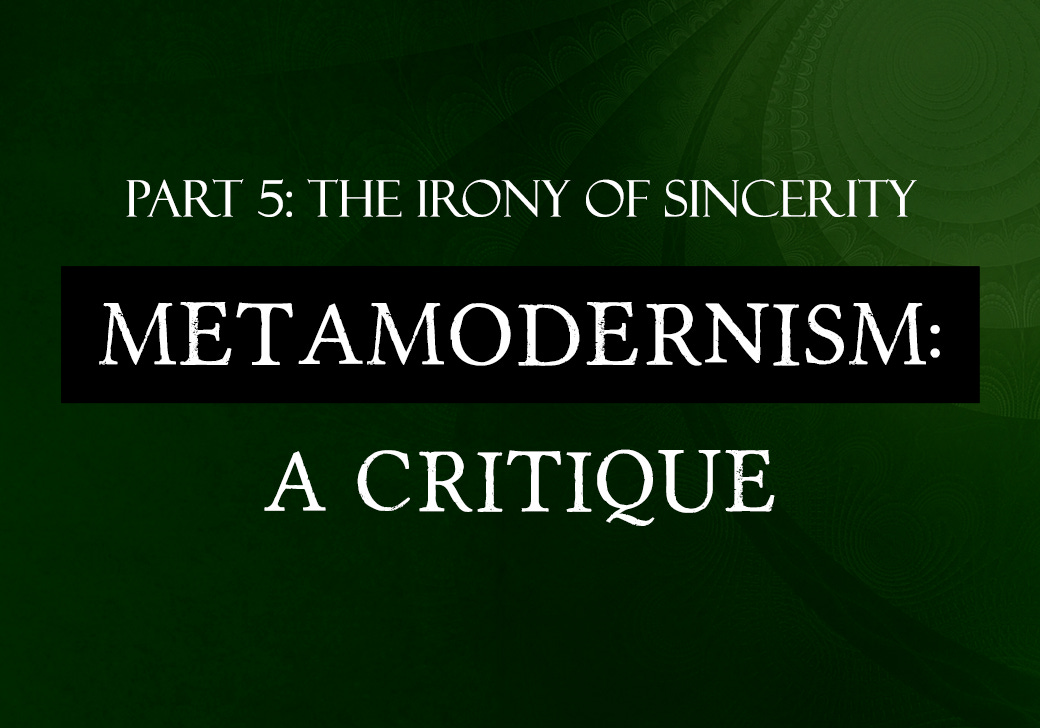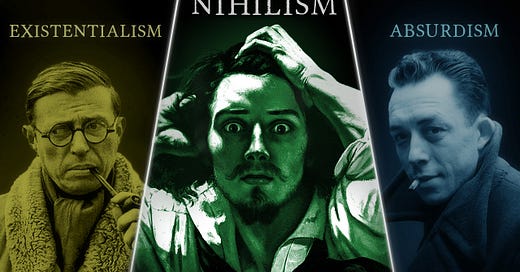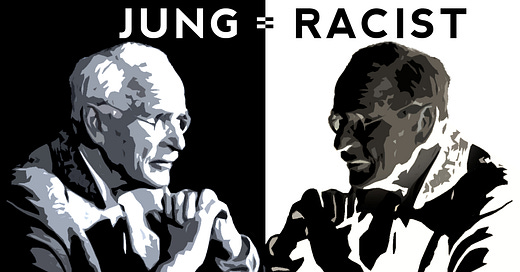
This is the fifth in a series of critical ponderings on Metamodernism. Previous instalments: Intro, Part 1, Part 2, Part 3, Part 4, Part 5, Part 6, Metamodern Meaning Podcast.
In this instalment of the Metamodernism Critique series, I want to talk about a blindspot in the Metamodern narrative.
As previously noted, the Dutch art scholars who effectively baptised the Metamodern movement had noted some trends in the arts that didn’t fit the Postmodern aesthetic “sensibility”. We have terms like “informed naiveté”, “pragmatic idealism” and the most distinctive one “ironic sincerity”.
So much of metamodern discourse is an optimistic simping over the capacity for this new aesthetic sensibility to get back to believing in things — to an earnest affirmation of something. There’s no better example than Bo Burnham’s Inside where he uses irony to address how ridiculous it is for a white male comedian to be complaining about his mental health and talking about world issues. The irony signals his acknowledgement of this but doesn’t collapse into a detached stance but allows him to earnestly talk about things in the world through the veil of this irony.
Another great example is my fellow Limerickman Blindboy Boatclub — a podcaster who talks about mental health among other things. Blindboy was part of a satirical musical duo called Rubberbandits which every Limerick (or Irish) schoolboy was aware of back in the day. They started with prank calls but went on to have a number one hit with a song called Horse Outside which will give you a solid sense of what we are talking about here.
The duo were famous for doing a comical Limerick accent and wearing plastic bags on their heads. Fast forward a couple of decades and Blindboy keeps wearing the plastic bag and talking in the accent. What started as a comical gimmick has become an ironic medium which enables Blindboy to communicate with the utmost sincerity — an earnestness that would not be possible without the ironic mask of the plastic bag and voice.
This is the positive side of ironic sincerity. This is what Metamodernists are talking about when they are talking about Metamodernism. But ironic sincerity is a double-edged sword. Metamodern writer Hanzi Freinacht’s idea cuts both ways:
“Without the irony and the sarcasm, my sincerity would simply be too much; it would awaken severe suspicions, and for good reason too.”
As well as being used by artists to speak earnestly in an era of jaded irony, there is a darker side to ironic sincerity. Consider 4Chan — the place that gave us Rick Rolling, Rage Comics, Pepe the Frog, Caturday and Gamergate. It’s a place where Neo-Nazism and anime weebs converge — the birthplace of the alt-right. In short, it is the proud sewer of the internet.
4Chan is famous for using ironic sincerity as a motte and bailey. When pushed on jokes about white supremacism and Neo-Nazism the troll can easily reply: “it’s a joke — for the lulz” (or keks, as it were). It’s hard to tell with 4Chan how much is serious and what the underlying ideology is (though we can eliminate anything left of John McCain without pause). This isn’t a new danger. It’s something Jean-Paul Sartre warned of decades ago:
“Never believe that anti-Semites are completely unaware of the absurdity of their replies. They know that their remarks are frivolous, open to challenge. But they are amusing themselves, for it is their adversary who is obliged to use words responsibly, since he believes in words. The anti-Semites have the right to play. They even like to play with discourse for, by giving ridiculous reasons, they discredit the seriousness of their interlocutors. They delight in acting in bad faith, since they seek not to persuade by sound argument but to intimidate and disconcert. If you press them too closely, they will abruptly fall silent, loftily indicating by some phrase that the time for argument is past.”
Thus, just as Blindboy can use his mask as a means to speak candidly about mental health, the alt-right can use irony as a mask for spreading views that they couldn’t otherwise.
This is the real lifeblood of ironic sincerity in the internet age (though corecore may be a better 2020s example. Maybe. I’m too scared to go near TikTok and find out). In the political domain, it has been used by the far-right far more and far more successfully than anywhere else on the political spectrum. In the domain of mental health, it’s used as a way of talking about deep problems in both healthy and unhealthy ways. It is a great way of normalising taboo while having fun. All of this is undoubtedly ironic sincerity but it is not the rosy utopian ironic sincerity of the Metamodernists but the true discourse of the Internet age.
In contrast, go out and read and watch and interact with Metamodernists. Check out Shia LaBeouf’s Metamodern art performances and then watch Internet Historian’s account of 4Chan’s trolling of him. What you find is that the Metamodernists are far from being so advanced in their use of irony that they win the day. Instead, their earnestness is so transparent that it is easily taken apart by irony and it ends up looking cringy.
When I first picked up Hanzi Freinacht’s book The Listening Society I found it off-putting and threw it away for a year or two. Hanzi Freinacht is not a real person but a fictional creation. This creation is an attempt at recreating Bo Burnham’s quasi-fictional stage personality or Blindboy’s ironic persona. Freinacht’s idea is that:
“the distance-creating irony and sarcasm are what allow me to be perfectly honest and genuine with you, to be absurdly sincere and thereby ridiculously vulnerable.”
Instead, I found it cringy. It felt like one of those adolescent imitators of Nietzsche who are too grandiose in their style and it ends up being cringy. It’s not ambiguously true like Burnham or Blindboy — it’s a complete fiction and ends up lacking any soul. On a return visit, I pushed through the cringe and found a veritable treasure trove of insights. Be that as it may, it doesn’t erase my first encounter; the initial attempt at exemplifying ironic sincerity remains cringe.
In The Listening Society Freinacht proclaims
“another ironic quirk of our age: Irony brings trust. And trust crowns a winner.”
I don’t deny it. The victor, however, is not the (let’s face it) earnest Metamodernists but the darker angels of our nature. In the democratic age of communication, ironic sincerity gives this long-suppressed shadow a voice. While Metamodernism uses ironic sincerity to give voice to an optimism the “postmodern” left in its Shadow, the populist right uses ironic sincerity to give voice to much deeper and longer buried demons (see: Aphorism #3: Fascism as Nietzschean Drive).
In contrast to the irony pilled Right of the 21st century, survey the Metamodern literature and you’ll find little irony. When you do find it, it usually reminds you of LaBeouf in its affectedness. As such it’s usually rather cringy. Compare with a book like Bronze Age Pervert (BAP)’s 2018 book Bronze Age Mindset which gained a cult following among Trump staffers at the time. If irony crowns a winner then recent politics are no mystery.
I put this down to the point I made in the previous critique:
“The Integral crowd snuck into the cultural studies nest, parasitically infecting and commandeering the host movement”
I think what’s going on is that the Integral crowd are LARPing as Metamodernists. They read that ironic sincerity is part of Metamodernism and so they try to embody that as a signal of their advanced state. But it doesn’t work. Instead, it undermines their earnestness.
Of course, they can’t part with the Ironic Sincerity since then they’d perhaps become merely another subculture among the subcultures. By clawing onto Metamodernism it enabled the rebirth of the Hegelian developmental hierarchy and the chance to be top dog.
Ironic sincerity may be a discourse of the Internet age but this doesn’t come with a whole heap of Integral baggage in tow. Instead, it is a neutral form of discourse that may even be associated more with Millennials and their sense of humour. It’s worth checking out JREG’s (another great example of ironic sincerity) video on irony to see how this ironic sincerity (which he calls post-irony) has another form beyond it which seems to be why so many people are baffled by Gen Z humour (he calls it, in a very confusing way for our purposes here, meta-irony). This meta-irony doesn’t strike one as being particularly “Metamodern” and while it smacks of rhizomatic memetic mutation I struggle to see how it might fit into a narrative of cultural evolution. But maybe that’s just me.
Next:
Previous:


















“Integral crowd are LARPing as Metamodernists. They read that ironic sincerity is part of Metamodernism and so they try to embody that as a signal of their advanced state. But it doesn’t work. Instead, it undermines their earnestness.”
very well put. i had a similar experience with Hanzi though i never went back - and feel a similar way about Brendan, Marc, and Zak creating characters to communicate their visions. these are all deeply serious people who take their ideas deeply seriously, and their playfulness doesn’t read as remotely as considered or fun(ny). there’s no compensatory self-satirizing or edginess that jreg or burnham do that signals humility or vulnerability, nor effective mockery and double-speak that make far right memetics compelling — not that integralists would go there.
i do believe some oscillation between irony and sincerity makes the best art at the moment, and i get why philosophers would want to get in on this as a way to catch fire, but falling short does come off worse than not trying at all.